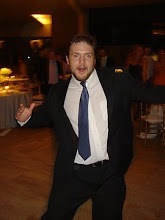As a junior high school baseball player, unable to master the vagaries of the slow roller.
As a senior high school wrestler, beaten for the second time at the district meet by a guy that was just a little bit better. Or a little less afflicted by a bum shoulder. Schreiber, of Cuyahoga Heights. He didn't even go to State.
As a freshman college football player, just a little too slow (who knew 3 tenths of a second could be such an eternity?) and weary of recurring injury.
Other than the at the end of every time I rewatch Major League, these are the last three times I remember crying- when I came to the conclusion, or that conclusion was delivered, that my time to "play" was over. It wasn't necessarily the failure, I don't think- it was the finality of that ending. For those of us who participate in these things, it's not like the end of a lost game or match, a poor grade, or a bad day at the office- for these failures, there is always tomorrow and an opportunity to do better. I liken this feeling more to a little death- of hope, perhaps- of something inside.
I find it very difficult to rationalize these "little deaths."
Another time I cried that I can recall was on the last day of fourth grade. I remember it vividly- sitting at our desks, the clock inching toward 2:30, Sister Jane giving the day's final announcements on the P.A. At my elementary school, Dionne Warwick, Stevie Wonder, Luther Vandross & Whitney Houston singing "That's What Friends Are For" was the customary good-bye song that played over the P.A. In past and coming years, this had been the happiest of moments- as soon as those jerks stopped singing, we were free to go. In fourth grade, leaving Miss Meehan's class, though, a funny thing happened: we didn't want to go. As Stevie started playing that harmonica, the first of us started sniffling. By the time Whitney jumped in, the whole room was bawling- boys, girls, everybody- with a semi-elderly Irish lady looking on with awe and kindness.
I've had many years to contemplate this phenomenon, and there are a few potential explanations, the fact that we LOVED Miss Meehan and we didn't want to leave her class being the audience's populist choice. Hormonal imbalances, childhood immaturity, and mass psychogenic illness round out the likely possibilities. I have an alternate theory, though, and one that is itself rather depressing: Each of us, in our 10-year-old heads, had come to the same realization independently but as a group- that this had been, and would be remembered as, the best year of our lives. Every other year to follow would not measure up.
This, it seems, would be something to mourn. And so we did, without really understanding why. And I feel as if the early part of my twenties has been spent tacitly giving credence to this theory. I've been given much and produce little. I had high aspirations that have not been met with the requisite work ethic to achieve them. Business as usual was leaving me as just another worker bee amongst the hive of Americans that go to work everyday as a timewaster between the end of education and the onset of dementia.
This, it seems, would be something to mourn. And so we did, without really understanding why. And I feel as if the early part of my twenties has been spent tacitly giving credence to this theory. I've been given much and produce little. I had high aspirations that have not been met with the requisite work ethic to achieve them. Business as usual was leaving me as just another worker bee amongst the hive of Americans that go to work everyday as a timewaster between the end of education and the onset of dementia.
I will turn 30 this year. The choices are clear, and time isn't exactly running out, as far as I know. But it continues to tick.
These were the thoughts I reflected on as I made my way towards the Queensboro Bridge, a bridge I'd once before stutter-run in an abortive training exercise to Roosevelt Island weeks earlier. We would be running on the lower level. Adjacent racers howled under the overpass as we entered, their voices reflecting off the concrete and steel above back to us below, formulating an initial crescendo of voices that dropped into the unsilence of a thousand feet hitting pavement amidst the occasional grunt. I slowed to a walk on the approach- this was not the first time, nor would it be the last, that I dropped my pace, but it was the first time I had done so willingly, without the prompt of a shot of pain from my legs. "What's the point?" I whispered aloud. I came to a halt.
Runners passed on my left as I hauled my right leg onto the divider and tried to stretch out the recurring cramps that had hounded me for the previous three miles. I stared blankly ahead at the curvature of the bridge ceiling. I considered the possibility that should one of these cramps develop into a muscle pull, my race would be over. Maybe that would be a good-
No.
I would be running when I hit Manhattan.



